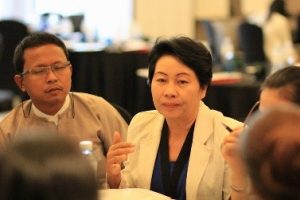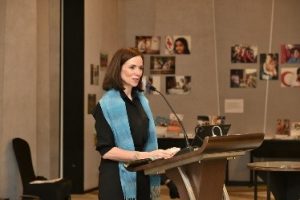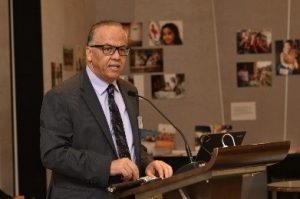Gender and Diversity Mainstreaming in Disaster Risk Reduction: Four Years of Progress in Southeast Asia
Representatives from eight Southeast Asian National Societies (NS) and National Disaster Management Offices (NDMOs), as well as regional partner institutions and donor partners, came together to reflect on the work of IFRC’s Regional Resilience Initiative (RRI) during the Lessons Learned Workshop in Bangkok, 21-23 February 2018.
Funded by the Canadian Government and the Canadian Red Cross, RRI was launched in 2014 with the aim of reducing the impact of natural disasters on vulnerable communities through building of capacities and skills of the 11 Southeast Asian NS and fostering network with regional partners. Among the flagship initiatives of RRI, the focus on increasing integration of gender equality into national and regional disaster risk reduction (DRR) policies and programmes has seen the most outstanding outcomes which have shifted the attitudes and practices of the Southeast Asian NS, in the way that gender and diversity (G&D) has been given priority in their DRR programme planning and implementation.
A shift to a more inclusive direction
Over the past four years, the Initiative has built the ground work for the NS G&D mainstreaming, starting from identifying the existing G&D work at the national level and, accordingly, providing training to relevant NS staff, and contextualizing tools such as the Minimum Standard Commitment to Gender and Diversity in Emergency Programming and the Gender and Diversity Assessment Tool, which are critical to transforming the operation of NS to be inclusive of G&D consideration. In maintaining the momentum, the Gender and Diversity Network was established in 2015 to provide the NS with opportunities and platform to exchange information and engage in peer-to-peer support. Resources and key documents related to G&D are shared on the Gender and Diversity Network page online, which is hosted on the RRI-developed Resilience Library.
The regional partnership among the NS in this respect has played an important role in influencing DRR regional policies and plans through regional dialogues e.g. the Southeast Asia Red Cross Red Crescent Leadership Meeting and the Asian Ministerial Conference on Disaster Risk Reduction (AMCDRR), the latter of which is the official platform of the Sendai Framework roll-out in Asia. At the ASEAN level, G&D was, for the first time, included in the thematic elements of the training program hosted by the ASEAN Coordinating Centre for Humanitarian Assistance on Disaster Management (AHA Centre) in 2015, and the curriculum has been replicated since.
IFRC’s cooperation with ASEAN in G&D integration has steadily increased and expanded, creating impact that goes beyond what was originally intended. In 2015, the ASEAN Secretariat approached IFRC to lead a research project on Sexual and Gender-Based Violence (SGBV) and disasters in collaboration with the ASEAN Committee on Women (ACW). The discussion led to a research implementation in three countries (Indonesia, Lao PDR, and the Philippines) resulting in a shift in the attitudes of stakeholders with regard to the SGBV theme.
 “The strength of the relations with ASEAN has gone further than we thought it would have. That in itself is exciting, especially for the fact that ASEAN has, at its recent ACDM [ASEAN Committee on Disaster Management] meeting, recognized the work of the Red Cross Movement and of our activities, such as the ongoing SGBV research.….That was not at all thought possible when we were first thinking of how far we thought we would be able to get.”
“The strength of the relations with ASEAN has gone further than we thought it would have. That in itself is exciting, especially for the fact that ASEAN has, at its recent ACDM [ASEAN Committee on Disaster Management] meeting, recognized the work of the Red Cross Movement and of our activities, such as the ongoing SGBV research.….That was not at all thought possible when we were first thinking of how far we thought we would be able to get.”
Deborah Coté, Program Manager Asia, International Operations
Moving forward
As the workshop examined the achievements and lessons learned from the Initiative’s implementation, it was evident that the work in promoting mainstreaming of G&D has proved to be timely and relevant. In their recommendations, workshop participants underlined the needs to maintain the effort of integrating G&D in NS DRR program and planning, as well as the continuation of the capacity building of NS staff and national level stakeholders. Moving forward, integration of the Minimum Standard Commitments to Gender and Diversity in Emergency Programming into the NS standard operation procedures and strategies by the end of 2020 remains relevant and critical in ensuring the inclusiveness of NS program planning and implementation. Similarly, the Gender and Diversity Network is deemed an effective platform for peer-to-peer learning that needs to be continued and strengthened.
Achievements in numbers…
Between 2014-2017, the work of IFRC through the RRI initiative in promoting G&D integration has resulted in the following:
- 612 people trained on G&D
- 66 interventions carried out on G&D, including 32 trainings, 26 technical support to NSs and 8 technical support to external partners
- 6 NSs having developed gender and diversity institutional policies and/or strategies
- 7 NSs having revised, contextualized, or translated gender and diversity tools for inclusive programming based on inclusive Vulnerability and Capacity Assessment and the Minimum Standard Commitments tools
- 3 NS having conducted institutional gender and diversity self-assessments
“An area that we would like to see the National Societies build on [beyond RRI] is broadening of partnership… moving outside the natural partnerships with the NDMOs to broaden it, to include women union, women institutions, and ministries of education, ministries of health. These are as some of the examples as to where we need to build on with the NS.”
Marwan Jilani, Head of IFRC Country Cluster Support Team in Bangkok
 “The technical and financial support by IFRC has helped the Lao Red Cross’s Department of Advancement for Women develop important and necessary documents that raise awareness of gender rights, namely, the 2016-2020 Strategic Plan, the Lao translation of the Minimum Standard Commitments to Gender and Diversity in Emergency Programming, and the poster providing guidelines on how to implement the Minimum Standard Commitments. These documents are important and necessary in helping the Lao Red Cross in raising awareness on gender rights at community level.”
“The technical and financial support by IFRC has helped the Lao Red Cross’s Department of Advancement for Women develop important and necessary documents that raise awareness of gender rights, namely, the 2016-2020 Strategic Plan, the Lao translation of the Minimum Standard Commitments to Gender and Diversity in Emergency Programming, and the poster providing guidelines on how to implement the Minimum Standard Commitments. These documents are important and necessary in helping the Lao Red Cross in raising awareness on gender rights at community level.”
Ketkeo Oupalavong, Deputy Head of Advancement for Women/Gender and Diversity Focal Point
Read also: Canadian Red Cross highlights RRI’s work in “Reducing the impact of natural disasters in Southeast Asia” blog post on 14 April 2018.
![]()



